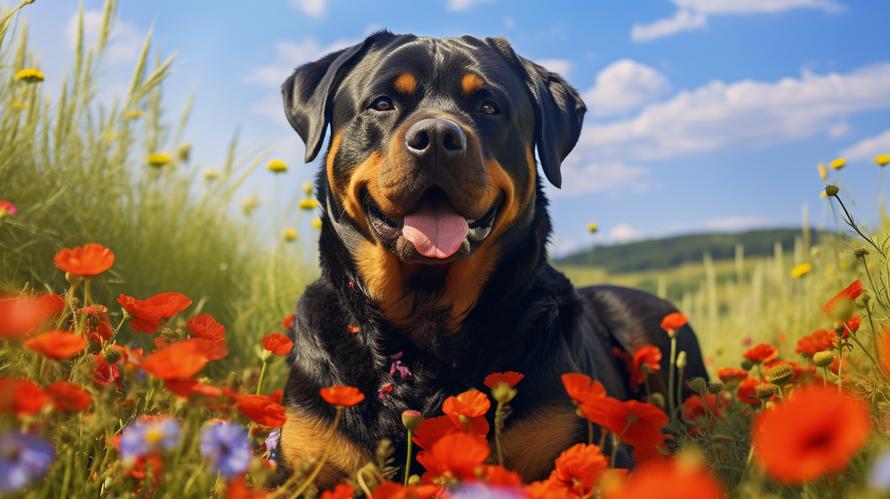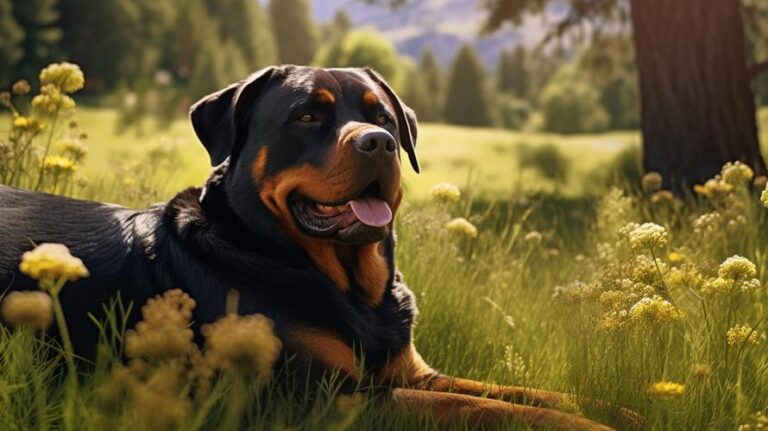Championship dogs bounding across the television screen, those magnificent examples of canine vitality and beauty, they all have one thing in common- they have whisker-licking-good meals. And let’s not forget Rottweilers, a breed known for its impressive stature and profound loyalty. But have you ever thought about what these furry stars are munching on? Is it the everyday dog food stacked on your supermarket shelf, or is there more to the story?
Perhaps you’ve heard recent hoopla about grain-free diets for dogs. It’s the latest trend in the world of pet nutrition, celebrated for its many perceived benefits. Before you rush to revamp your Rottweiler’s menu, let’s take it slow and delve into the world of doggie diets. It’s crucial to understand whether this fad stands up to scientific scrutiny for your beloved Rottweiler.
To start with, imagine your pet’s digestive system as a modern-day factory. Yes, imagery is a bit odd, but factories and your pet’s gut are not too dissimilar. Both run smoother when they have the right fuel in the right proportions. Dogs, like us humans, are omnivores, capable of processing a variety of foods. But that doesn’t mean they can, or should, eat everything. Getting the blend right can be the differential between a tail-waving, tongue-lolling, happy Rottie and an overweight, lazy, or sick one.
The majority of widely available dog food contains a certain amount of grains, as they’re a rich source of carbohydrates. Carbohydrates, broken down into simple sugars, provide instant energy, enabling your pupper for those wild runs around the park or entertaining games of fetch. But, are all sources of carbohydrates equal, and is grain-free healthier?
Picture the average Rottweiler, an imposing creature radiating strength, fit to burst with energy and alertness. Rotties are, by nature, extremely active dogs prone to muscular issues if they don’t get the right nutrition. Over the years, a minority of Rottweilers experienced issues with grain-based diets, leading to the dramatic debate on grain-free diets for dogs, especially for this breed.
Rottweilers, like any other breed, can develop food allergies. Some may be sensitive to grains like wheat, corn, or soy leading to skin irritation, excessive scratching, or gastrointestinal issues. It’s here that grain-free diets become helpful. If your Rottie falls into this category, a grain-free diet can lead to remarkable improvements in allergic symptoms.
In addition to alleviating allergy symptoms, grain-free diets may result in smaller stools, reduced flatulence, healthier skin, and a shinier coat. Such outcomes can be attractive to many Rottweiler owners, but are these benefits worth the potential risks?
What you might not have heard is that grain-free doesn’t always mean low-carb or healthier. Some grain-free dog foods replace grains with potatoes or legumes, which can deliver a higher carbohydrate punch than grains. This can potentially lead to weight gain, not ideal for a breed already prone to obesity. Additionally, the Food and Drug Administration (FDA) is studying a potential link between grain-free diets and a specific type of heart disease in dogs called dilated cardiomyopathy (DCM). The truths about grain-free diet are more complicated than the label presents.
Before you transition your Rottweiler to a grain-free diet, consult with a trusted vet or a canine nutritionist. They can help determine if your pet has a genuine grain allergy and advise dietary adjustments tailored to your pet’s unique needs. They say fortune favors the informed, and that certainly holds for your Rottweiler’s diet.
In conclusion, understanding what’s in your Rottweiler’s bowl can make a world of difference to their health and happiness. Each Rottie is unique and deserves a nutrient-rich diet that suits their specific dietary requirements and lifestyle.
Whether your Rottweiler should eat grain-free isn’t a one-size-fits-all answer. It depends on several factors like allergies, lifestyle, age, and overall health. Grain-free diets can undoubtedly benefit Rotties with grain allergies or intolerances. But, for others, a well-balanced diet that includes healthy grains might be a more nutritious and safer option.
Dog food is much more than just filler for your pet’s stomach; it’s the fuel that drives their lives. Ensuring that this fuel is not just palatable but nutritionally optimal is one of the best things you can do for your faithful companion’s health and longevity. The key lies in understanding your Rottweiler, its needs, and finding a balance that consists of proteins, fats, carbohydrates, vitamins, and minerals in the correct proportions. After all, well-fed Rottweilers are happy Rottweilers, and happy Rotties make for even happier owners. Be the person your Rottie believes you are, informed, decisive, and decisively sniffing out what’s best for them.
And remember, at the end of the day, it’s the wag of the tail, the bounce in their step, and the sparkle in their eyes that truly tell you if your Rottweiler is happy with their meal, grain-free or not!



